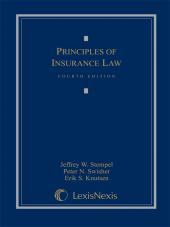We are in the process of migrating the LexisNexis Store. During this transition, some customers may not be able to access their Download Center or new electronic orders. Please call Customer Service 1-800-833-9844 or Chat With A Support Representative <https://supportcenter.lexisnexis.com/app/chat/store_chat/>
Principles of Insurance Law
Select subscription type
Terms & conditions
Subscribers receive the product(s) listed on the Order Form and any Updates made available during the annual subscription period. Shipping and handling fees are not included in the annual price.
Subscribers are advised of the number of Updates that were made to the particular publication the prior year. The number of Updates may vary due to developments in the law and other publishing issues, but subscribers may use this as a rough estimate of future shipments. Subscribers may call Customer Support at 800-833-9844 for additional information.
Subscribers may cancel this subscription by: calling Customer Support at 800-833-9844; emailing customer.support@lexisnexis.com; or returning the invoice marked "CANCEL".
If subscribers cancel within 30 days after the product is ordered or received and return the product at their expense, then they will receive a full credit of the price for the annual subscription.
If subscribers cancel between 31 and 60 days after the invoice date and return the product at their expense, then they will receive a 5/6th credit of the price for the annual subscription. No credit will be given for cancellations more than 60 days after the invoice date. To receive any credit, subscriber must return all product(s) shipped during the year at their expense within the applicable cancellation period listed above.
Subscribers receive the product(s) listed on the Order Form and any Updates made available during the annual subscription period. Shipping and handling fees are not included in the annual price.
Subscribers are advised of the number of Updates that were made to the particular publication the prior year. The number of Updates may vary due to developments in the law and other publishing issues, but subscribers may use this as a rough estimate of future shipments. Subscribers may call Customer Support at 800-833-9844 for additional information.
Subscribers may cancel this subscription by: calling Customer Support at 800-833-9844; emailing customer.support@lexisnexis.com; or returning the invoice marked 'CANCEL'.
If subscribers cancel within 30 days after the product is ordered or received and return the product at their expense, then they will receive a full credit of the price for the annual subscription.
If subscribers cancel between 31 and 60 days after the invoice date and return the product at their expense, then they will receive a 5/6th credit of the price for the annual subscription. No credit will be given for cancellations more than 60 days after the invoice date. To receive any credit, subscriber must return all product(s) shipped during the year at their expense within the applicable cancellation period listed above.
Product description
View a sample of this title using the ReadNow feature
To purchase a printed version of this title, please visit www.caplaw.com.
Over the past two decades, there have been a number of important developments in the areas of liability, property, and life and health insurance that have significantly changed insurance law. Accordingly, this edition of Principles of Insurance Law has been substantially rewritten, reformatted, and refocused in order to offer the insurance law student and practitioner a broad perspective of both traditional insurance law concepts and cutting-edge legal issues affecting contemporary insurance law theory and practice. This edition not only expands the scope of topical coverage, but also segments the law of insurance in a manner more amenable to study, as well as facilitating the recombination and reordering of the chapters as desired by individual instructors. The Fourth Edition of Principles of Insurance Law includes new and expanded treatment of important insurance law developments, including:
• The critical role of insurance binders as temporary forms of insurance as illustrated in the World Trade Center property insurance disputes resulting from the terrorist attacks of September 11, 2001;
• The continuing debate between “legal formalists” and “legal functionalists” for “the heart and soul” of insurance contract law;
• What constitutes a policyholder’s “reasonable expectation” regarding coverage;
• The current property and liability insurance “crisis”;
• Risk management and self-insurance issues;
• Emerging, and frequently conflicting, case law concerning the intersection of insurance law and federal anti-discrimination regulation;
• Ongoing interpretive battles over the preemptive scope of ERISA;
• The United States Supreme Court ruling that a California statute attempting to leverage European insurers into honoring commitments to Holocaust era policies is preempted by the Executive’s power over foreign affairs;
• The State Farm v. Campbell decision, which struck down a $145 million punitive damages award in an insurance bad faith claim as well as setting more restrictive parameters for the recovery of punitive damages;
• New issues over the dividing line between “tangible” property typically covered under a property insurance policy and “intangible” property, which is typically excluded - an issue of increasing importance in the digital and cyber age;
• Refinement of liability insurance law regarding trigger of coverage, duty to defend, reimbursement of defense costs, and apportionment of insurer and policyholder responsibility for liability payments;
• The difficult-to-harmonize decisions concerning when a loss arises out of the “use” of an automobile;
• Insurer bad faith and the availability, if any, of actions against a policyholder for “reverse bad faith”; and
• he degree to which excess insurance and reinsurance may be subject to modified approaches to insurance policy construction.
The Teacher’s Manual highlights the differences between the Third Edition and the Fourth Edition. In addition, it includes case-brief summaries of the major cases excerpted in the book; authors' analyses of the notes, questions, and problems that follow the principal cases; and offers alternative syllabuses for planning purposes.
Professors and adjunct professors may request complimentary examination copies of LexisNexis law school publications to consider for class adoption or recommendation. Please identify the book(s) you wish to receive, provide your institutional contact information, and submit your request here.
This book also is available in a heavily discounted, three-hole punched, alternative loose-leaf version printed on 8 ½ x 11 inch paper with wider margins and with the same pagination as the hardbound book.
epub is protected by Adobe DRM.
eBooks, CDs, downloadable content, and software purchases are noncancelable, nonrefundable and nonreturnable. Click here for more information about LexisNexis eBooks. The eBook versions of this title may feature links to Lexis+® for further legal research options. A valid subscription to Lexis+® is required to access this content.
Table of contents
- Chapter 1. Insurance History and Fundamental Concepts
Chapter 2. Contract Law, Legal Theory, and the Construction of the Insurance Contract
Chapter 3. Government Regulation of Insurance
Chapter 4. The Formation, Operation, and Termination of the Insurance Contract
Chapter 5. The Insurable Interest Requirement
Chapter 6. Insurer's Limitation of Risk: Warranties, Representations, and Concealment
Chapter 7. The Insured's Defenses: Waiver, Estoppel, Election, and Contract Reformation
Chapter 8. Causation and the Concept of Accident
Chapter 9. Duties of the Policyholder and Insurer After Loss
Chapter 10. Property Insurance Issues
Chapter 11. Liability Insurance Issues
Chapter 12. Life, Health, and Disability Insurance
Chapter 13. Automobile Insurance
Chapter 14. "Bad Faith" Litigation and Claims Administration
Chapter 15. Insurance Layering: "Other Insurance," Excess Insurance, Self-Insurance, and Reinsurance
 Lexis Nexis
Lexis Nexis 



